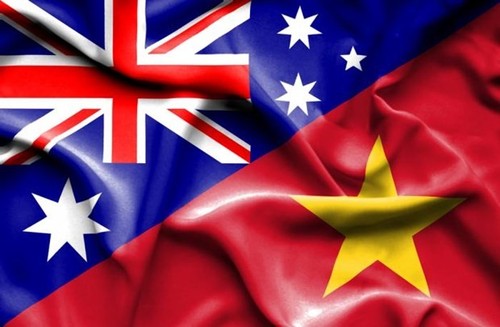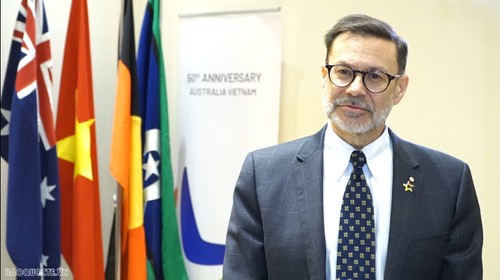 (Photo: VNA) (Photo: VNA) |
Vietnam and Australia established diplomatic relations on February 26, 1973, just a few days after the Paris Agreement on ending the war and restoring peace in Vietnam was signed.
Impressive achievements in 50-year cooperation
In 2009, the two countries established a comprehensive partnership and 9 years later they upgraded it to a strategic partnership, opening a new phase for bilateral relations. Over 5 decades, with several opportunities and challenges amid fluctuations around the world, Vietnam and Australia have become trusted partners in both bilateral and multilateral frameworks.
 Australian Ambassador to Vietnam Andrew Goledzinowski (photo: Viet Nguyen) Australian Ambassador to Vietnam Andrew Goledzinowski (photo: Viet Nguyen) |
Australian Ambassador to Vietnam Andrew Goledzinowski said: “I think I can say confidently that at no time in history has the relationship been stronger than it is today. It’s built on a strong feeling of mutual trust and on practical cooperation in so many fields over so many years: defense cooperation, education, trade and important people to people exchanges.”
Vietnam and Australia are among the other’s top 10 trading partners, and last year two-way trade reached 15.7 billion USD last year, doubling the figure before their strategic partnership began.
The two countries have cooperated effectively at regional and global forums, include the United Nations, the Association of South Asian Eastern Nations (ASEAN), and the Asia-Pacific Economic Cooperation Forum (APEC). Australia is not just a key partner of Vietnam in the South Pacific region, it is also ASEAN's comprehensive strategic partner.
Vietnam is a friend and a close ASEAN and regional partner of Australia. Sharing benefits and common views, the two countries are committed to upholding the central role of ASEAN for a peaceful, stable, and prosperous region.
A future of great cooperation potential
The effective cooperation between Vietnam and Australia has brought clear, specific, and practical benefits to both countries. Now they have great opportunities to bring the multi-faceted cooperation to a new height.
The two countries share strategic benefits of peace, cooperation and development in the region. With their natural resources, human resources, and technological and financial capacity, the two economies are mutually supportive. In addition to the three pillars of strategic partnership - economics, national security, and innovation - they are now considering some other pillars of bilateral cooperation. Climate change response, green economy, clean energy, knowledge-based economy, and digital transformation will be new areas of bilateral cooperation in the near future.
Ambassador Goledzinowski said the two countries should increase strategic dialogue, create some new mechanisms, and consider upgrading relations. He said: “In our system, our development programs have to have at least 80% of all programs with impact on women and in this country, it’s even higher. What we know in Australia and this is what international research also underlined is this will give women the opportunity to fully develop in commerce and in government. Vietnam is really all about of what we are doing and I think that will continue to grow.”
Vietnam and Australia are at threshold of a new period of cooperation. What they have achieved in cooperation in the past 5 decades shows that they need to work closely to ensure mutual benefit. In 2023, the two will not just review the achievements of their bilateral ties, but also look forward to a future of strengthened friendship and strategic partnership.